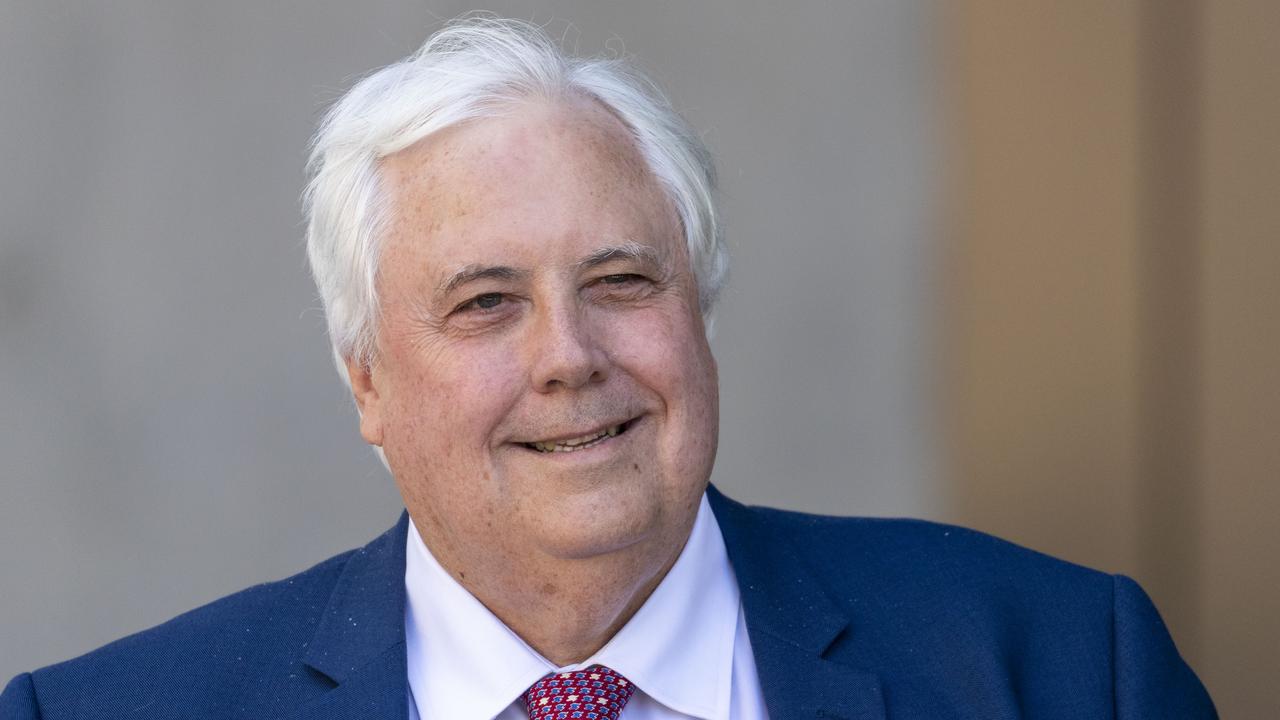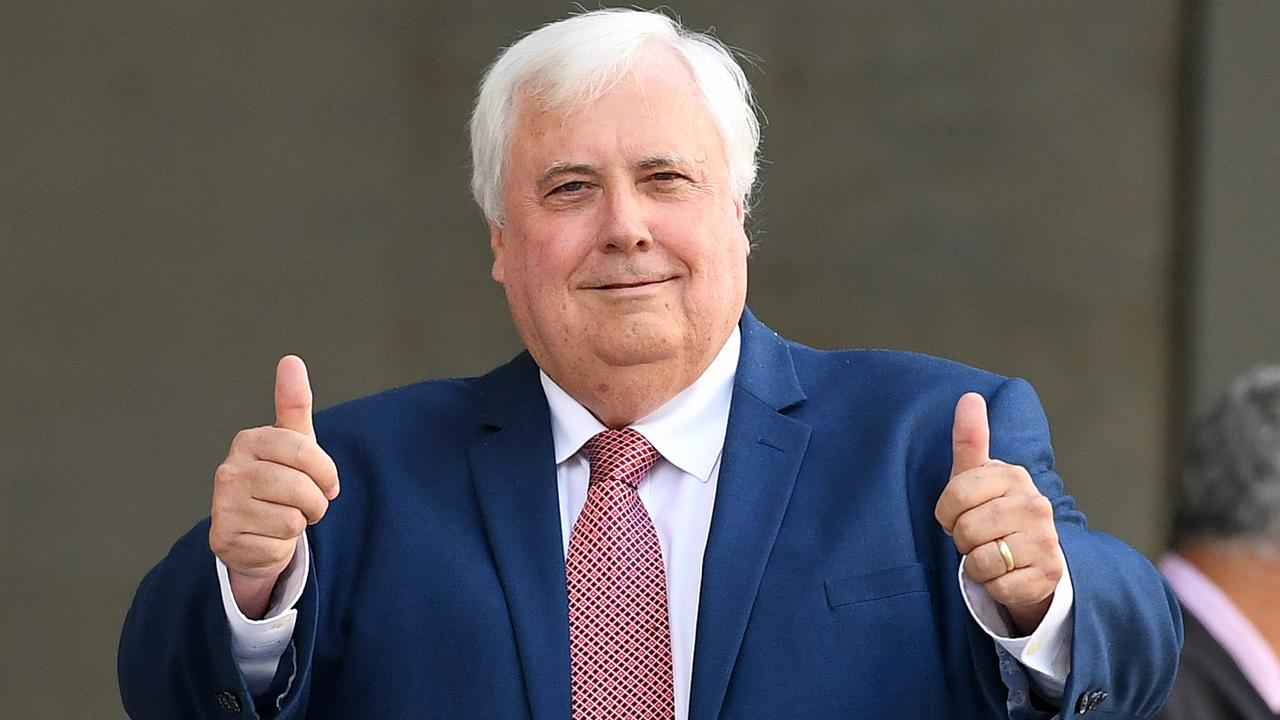Clive Palmer’s desperate refinery needs a nickel
The nickel refinery owned by Clive Palmer since 2009 has operated on borrowed time. It is a financial basket-case.
For 40 years it has been one of north Queensland’s dirtiest but most important employers, a powerful driver in the region’s economy, and a cash-cow and albatross for Alan Bond, BHP Billiton and Clive Palmer.
But the nickel refinery owned by Clive Palmer since 2009 and run by his friends and relatives at Yabulu near Townsville has been operating on borrowed time. It is a financial basket-case.
Mr Palmer can be justly criticised for a range of reasons — including refusing to spend money to properly maintain its ageing machinery, leading to constant costly breakdowns; stripping some $100 million out of the refinery’s accounts to infuse his other flagging businesses with cash; and letting toxic sludge from full tailings dams spill into the Great Barrier Reef Marine Park’s wetlands areas.
But, at the end of the day, the Palmer United Party founder’s refinery and his 600-plus employees are casualties of the global slump in the price of nickel.
For too long, every pound of nickel that comes out of the refinery has sold for less than the cost of production. This is unsustainable.
Mr Palmer, who signs the cheques and stays closely involved in the running of his business (notwithstanding his public claims to the contrary), has expert advice that the only way the refinery can remain operational and solvent is with a large cash injection. He bled the refinery of its financial lifeblood when the nickel price was much higher. Now it has run dry.
As a self-proclaimed billionaire, it will be galling for Mr Palmer to be effectively acknowledging one of two unavoidable conclusions — either he does not have the funds from his own private wealth to save his refinery from going bust or he has the funds but he does not want to risk throwing good money after bad and putting himself in a personally embarrassing financial predicament.
His angle instead is to blame the Chinese government-owned Citic Pacific, from whom he has demanded urgent payment of $48m, related to the royalties he claims he is owed for the mining of his iron ore tenements in Western Australia’s Pilbara region.
Mr Palmer’s legal argument in the Supreme Court in Western Australia runs like this: if the Chinese don’t cough up for royalties tied to an unrelated iron ore project which is part of a different corporate structure, the nickel refinery on the other side of the country closes.
But even if the Chinese were to lose an urgent Supreme Court case, which is due to start in Perth on Monday, or even if, hypothetically, Beijing volunteered to pay the huge sum today and put it into the bank account of his flagship company, Mineralogy, Mr Palmer would not be under any obligation to transfer the cash to the refinery.
Indeed, while the price of nickel languishes below its cost of production, his financial people would probably tell him to forget the refinery, and to mothball it until it can become profitable again with a recovery in the price of nickel.
When The Australian asked Mr Palmer about these matters after word had leaked that his staff went to Premier Annastacia Palaszczuk’s government to plead for an urgent $25m of taxpayers’ money for the refinery, he struck a defiant note, stating that “Queensland Nickel is debt-free and has net assets of over $1.9 billion, far more than The Australian and (Brisbane’s) The Courier-Mail glued together”.
Mr Palmer issued a statement on parliamentary letterhead in which he said: “Queensland Nickel employs around 800 people and another 1500 people depend on its activities. It is responsible for over $1.3b worth of economic activity in Townsville. I put my money on the line for the people of North Queensland and that is the truth of the matter.”
Mr Palmer, who this time last year handed out a specially minted refinery medallion with his image on one side, also assured his staff that “there is no reason to panic just because the price of nickel dropped and create stories for journalists who can’t find a real story”.
Townsville Mayor Jenny Hill told The Australian yesterday, however, that she was confidentially briefed in her office in late October by Mr Palmer’s nephew, Clive Mensink, a director of the companies controlling the refinery.
She said Queensland Nickel “is an important part of our community both economically and socially, and it’s important that it stays open”.
While Mr Palmer’s public statements around the time of the closed-door briefing of Mayor Hill gave no hint of the refinery’s severe financial distress, the official accounts lodged with the Australian Securities & Investments Commission did feature unusual accounting.
These accounts show that, while the price of nickel was slumping and cash flow in the business was declining, the refinery’s net asset position was revalued from $562m in 2014 to almost $2b in 2015.
Auditors Ernst & Young, which reviewed the accounts and approved the changes in the accounting treatment, did not flag serious solvency issues.
They also signed off on an almost 90 per cent cut, totalling about $275m, in the amount calculated as the likely expenditure for the environmental clean-up of the heavily polluted site in the event of it ceasing operations.
ASIC should question whether the auditors were unaware of the looming “drop-dead date” for their client’s refinery, even as Mr Palmer’s staff have been trying to sell assets such as a jet for $7m.




